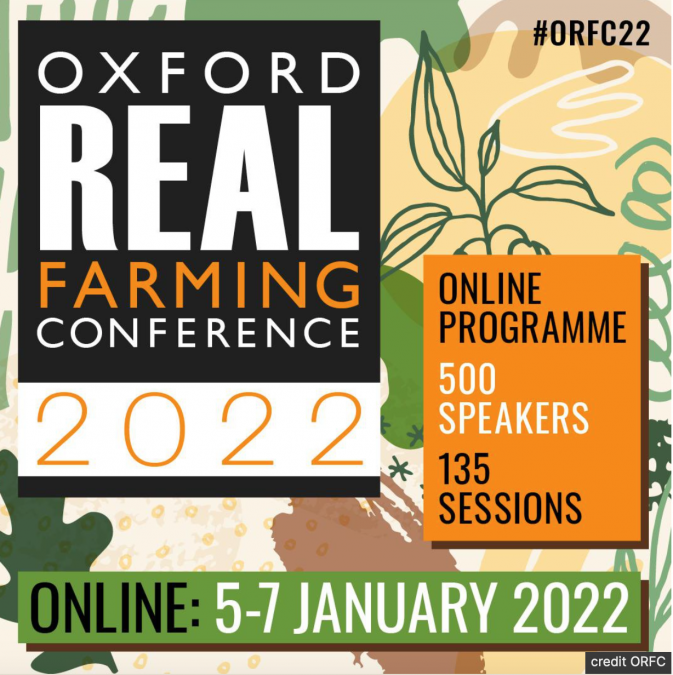
Shumei International recently participated in the thirteenth annual Oxford Real Farming Conference hosting a panel on “Improving Biodiversity and Soil Health in the UK with Natural Agriculture.” The panel presented varied perspectives from individuals who had experienced first-hand the benefits of the Natural Agriculture approach to farming. The online session was moderated by Mr. Ben Raskin of the Soil Association and was attended by participants from around the world.
Mr. Shinya Imahashi, who is the farmer of the Yatesbury Natural Agriculture Farm in the United Kingdom was the first panelist to present. He shared his experience working as a Natural Agriculture farmer, emphasizing the importance of soil purity and how this contributes to soil biodiversity and crop resilience. “With a pure heart, the soil becomes pure, and the food becomes pure and healthy,” he shared. His presentation also discussed seed saving, which is a core practice of Natural Agriculture.
Mr. Imahashi detailed how Natural Agriculture encourages continuous cropping rather than crop rotation, which had successfully produced yields of potatoes on the same plot of land year after year. As a Natural Agriculture farmer, he trusts in the inherent power of the soil to regenerate and grow healthy crops without additives and without the need to rest the soil. With continuous cropping, the seed and soil adapt to each other with each harvest and the Natural Agriculture crops become healthier and more resilient. To showcase the impact of Natural Agriculture on soil health, Mr. Imahashi presented research that measured the soil carbon, organic matter and microbial activity of the soil in his field. The soil health index indicated higher levels of soil microbial diversity and activity in his fields which were being cultivated continuously in comparison to untouched soil next to his field.
After Mr. Imahashi, Dr. Jasmine Black, a research assistant in Social Sciences and Artistic Research Methods at the Countryside and Community Research Institute (CCRI) at the University of Gloucestershire, spoke about her experience visiting Shumei farms across Japan. She observed the different approaches of farmers practicing Natural Agriculture. Each farmer listened to nature and looked for solutions to unique situations on their farm that would be aligned with the natural law. Some farmers integrated traditional farming techniques which strengthened their relationship with the land while others found ways to establish harmony within the ecosystem, in the case of infestation or disease, and apply an overriding respect for nature. Through this experience, Dr. Black recognized the importance of the farmer’s intentions and how Natural Agriculture helped farmers decide how and when to respond when faced with a challenge on their farm. In this way, Natural Agriculture transcends farming and becomes more of a way of life. Based on the diverse practice of Natural Agriculture, Dr. Black suggested the need for more research and comparison on the role of ethics and philosophy in agroecology.
The third panelist was Liam King, a Soil resilience and agronomic sustainability researcher from Essex University. His presentation focused on how to support a healthy plant and soil system through Natural Agriculture. Mr. King explained the mutualistic symbiosis in Natural Agriculture and how no single organism is working on its own. Rather, every organism is working in tandem to support each other.
One example he shared was show how the pH of the soil changes when disturbed by human interference, and the soil’s inherent ability to moderate its temperature also changes when it is disturbed, tilled, or filled with additives. As such, Natural Agriculture fields, which have less disturbance, have the potential to moderate temperature better in the face of climate change and the practice could also have implications on soil fertility based on the quality of the microbes and their interaction with the soil ecosystem.
The event was followed by a Q + A from the audience which was moderated by Ben Raskin. There was curiosity surrounding how Natural Agriculture works. For instance, several audience members asked about how soil can attain a high level of richness without manures. There was also interest in how to deal with soilborne diseases when practicing continuous cropping. The panel challenged traditional beliefs around soil capacity and fertility and encouraged participants to talk more openly about their relationship with nature and how this influences how they farm.
To view the full session as well as other sessions from the Oxford Real Farming Conference, click here.

